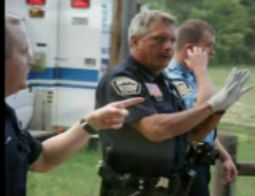The Saint Paul Pioneer Press
WOODBURY, MN – In Woodbury, the police will help if you get mugged.
 Watch a Tactical EMS team in action on ParamedicTV |
Or if your house catches fire.
Or if you have a heart attack.
That’s because Woodbury has become the only place in Minnesota where on-duty police fight crime, put out fires and respond to medical emergencies as paramedics.
“It’s a good idea,” said cop-fireman Spencer Scofield, as he emerged soot-covered from a flaming building at a training session last Tuesday. “The police are usually the first ones there, anyway.”
The city’s supercop program was recognized this week by the Humphrey Institute of Public Affairs for efficient government because it saves money and, potentially, lives. Response times in Woodbury have improved dramatically, and the program has saved the equivalent of 4.5 full-time jobs.
“Good things are happening here,” said Todd Johnson, deputy public safety director.
So far, 10 of Woodbury’s 63 police officers have been trained as firefighters. The extra training is worth $1.25 more per hour, in addition to base hourly wages ranging from $22 to $31.
Their squad cars have been replaced with specially equipped SUVs, packed with firefighting gear and clothing.
Ann Gergen applauded the city’s money-saving efforts. But Gergen, the associate administrator of the League of Minnesota Cities Insurance Trust, said the lessons might not be transferrable to other cities.
“This might be an exciting innovation for Woodbury, but it’s very city-specific,” Gergen said.
But other cities are curious. Officials are calling Woodbury Public Safety Director Lee Vague. “The reaction ranges from ‘You are crazy’ to ‘Wait and see,’ ’’ he said.
Woodbury first doubled-up police duties in the 1990s, when the city began training some police officers as paramedics.
Johnson said Woodbury has since become a good place to have a heart attack – with more than half of all victims surviving, compared with a national average of about 10 percent.
When paramedic cops answer calls today, they don’t have to wait for an ambulance to take action.
“They can even do minor surgeries,” Johnson said, including opening a blocked throat or withdrawing fluid from a stalled heart.
But blending firefighting into police work was more complicated.
The firefighters had to answer a soaring number of medical calls, about eight per day. But the fire calls remained low – the department got about two calls a day, mostly false alarms, and a call for a serious building fire once a month.
The city set a goal of having five firefighters on the scene of a fire within nine minutes, 90 percent of the time. In 2004, with a department of 80 on-call firefighters and only four full-timers, officials calculated they’d need to hire 32 more full-timers.
That was financially unthinkable. So officials tried a more creative approach.
They knew police – already cruising around town in cars – were usually the first at any fire.
“The family hears the sirens, and says, ‘Thank God.’ Then the squad car pulls up,” Vague said.
“There is nothing more helpless than a cop at a fire, just looking at it. What do we do? Get out a fire extinguisher? Direct traffic?”
The city decided to train some of its police officers to also handle fire duty. The results have been impressive: The city achieved the five-firefighter goal half the time in 2005, but 75 percent of the time in 2007.
This past Tuesday evening in White Bear Lake, Woodbury police officers Scofield and Jeff St. Martin got a reminder of how difficult being a firefighter can be.
They watched as smoke from a burning pile of straw belched out of a four-story brick training tower.
They lifted their 40-pound air tanks, pulled on their fireproof Nomex hoods and slipped into their yellow slickers and helmets. They checked their breathing masks and helmets.
The last stop before they plunged into the building was to drop off their name tags. They reclaim them when they emerge – so any leftover tag shows who is inside.
Working in pairs, they plunged into the building. The smoke was so thick it was like working with closed eyes. “You have to listen for the fire,” Scofield said afterward.
Feeling their way, they hooked a fire hose to a hydrant. Scofield’s partner blasted a fine mist of water across a room, temporarily clearing it so they could see.
They then climbed out a window and carefully down a ladder.
At the bottom, Scofield fidgeted to keep his safety alarm from going off – an alarm that sounds if a firefighter falls and stays motionless in a burning building.
Next to him, St. Martin rubbed at the mask marks on his wet face.
“When it is pitch-black and hot, you sweat in a hurry,” he said.
Was it worth the effort?
“Both careers are training-intensive, and it certainly can be overwhelming,” St. Martin said. “But the bottom line is the better service for Woodbury.”
Copyright 2008 The Saint Paul Pioneer Press

